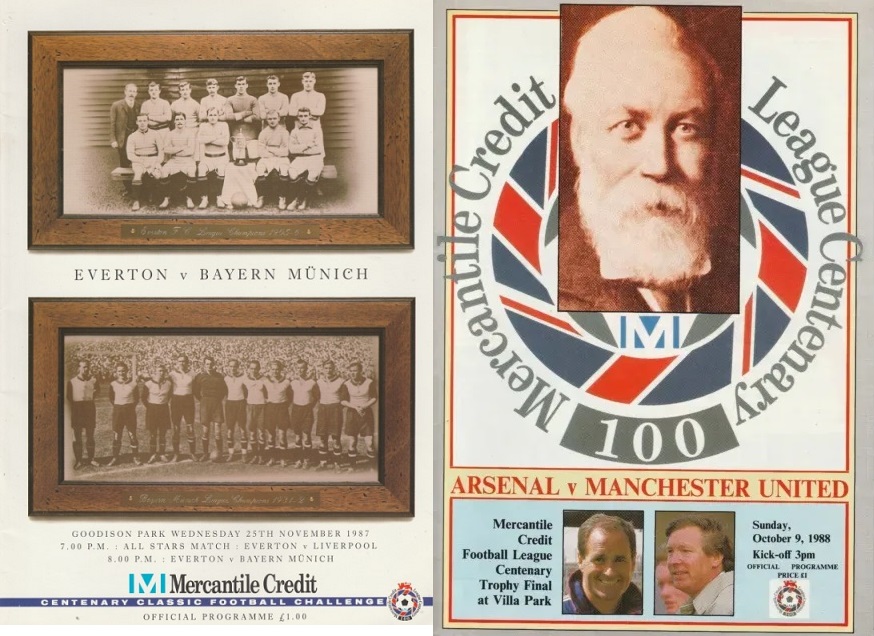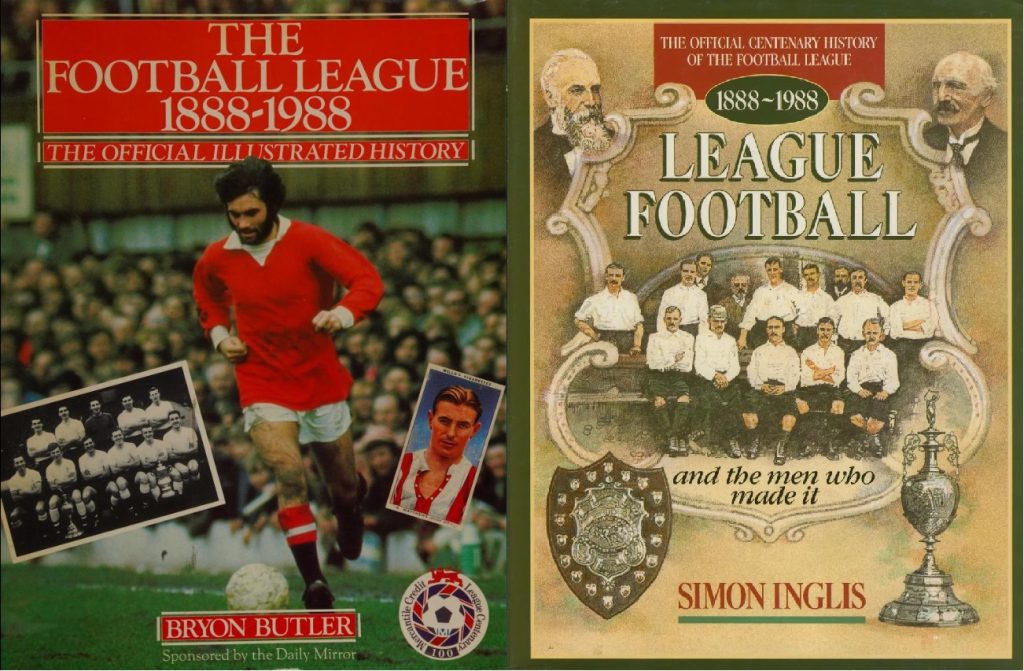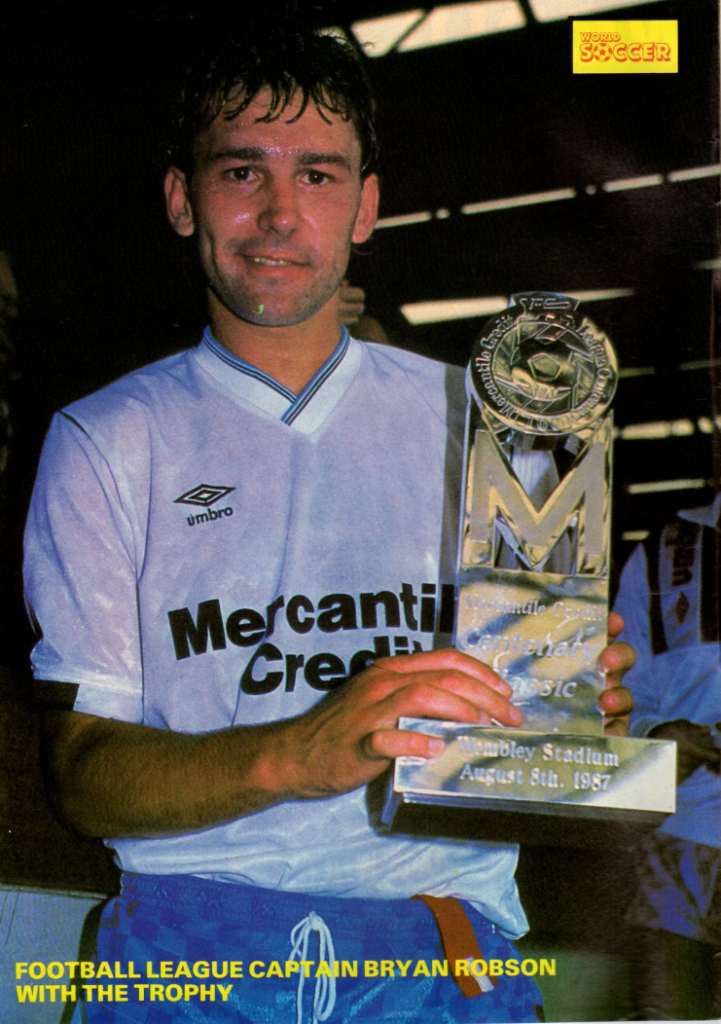Centenary Celebrations: The Football League 1987-88
The Football League began its Centenary celebrations in the 1987-88 season. After a hundred eventful years, there were ninety-two clubs in four national divisions. The 1980s had been a turbulent decade of falling attendances, financial crises and high-profile tragedies, but the League was determined to celebrate a century in style. Secretary Graham Kelly saw the year’s events as, “A superb opportunity not only to honour the foresight and vision of the Founder Members but also to complete the regeneration of the game’s image”. Sponsors Mercantile Credit underwrote the ambitious Centenary programme.

The celebrations kicked off with echoes of 1938’s Jubilee banquet, over a thousand guests attending a Centenary dinner at London’s Grosvenor House Hotel on 7 August 1987. The following day a Wembley fixture pitted the best of the Football League’s talent against the Rest of the World in the Centenary Classic. Pelé was the guest of honour at both. 61,000 turned up to watch World Champion Diego Maradona – with the ‘Hand of God’ still fresh in English fans’ memories, he was welcomed with boos but pocketed a £100,000 appearance fee – and Michel Platini, man of the match in his last game before retirement.
The two sides were managed by Bobby Robson and Terry Venables respectively, with Ossie Ardiles the Football League’s lone foreign representative. Despite the star-studded line-ups on display, the match still had the atmosphere of a glorified pre-season friendly and was punctuated by multiple substitutions. The League ran out 3-0 winners but the occasion failed to excite. Having seen his England captain Bryan Robson score twice (club team-mate Norman Whiteside with the other goal), Bobby Robson complained that “no one seems the slightest bit interested.”


Unfortunately the opening fixture set the tone for a year of underwhelming events with a string of cancellations, name changes and hastily rearranged formats. Off the pitch, the League had arranged a nationwide fun run in September 1987, and a series of concerts at Wembley Arena to coincide with the Centenary Festival weekend in April 1988. A classical music concert at the Royal Albert Hall (scheduled for October 1987) was cancelled, although Elkie Brooks headlined a revised gala celebration at same venue on 16 February 1988.





In the midst of the ban on English teams from European competition, the meeting of League Champions Everton and their Scottish counterparts Rangers should have been a highly anticipated occasion. The Centenary Challenge was scheduled for Maine Road in November 1987. Rangers chose not to take part, citing police advice on potential crowd trouble. They were replaced by European Cup runners-up Bayern Munich, who arrived at Goodison Park to lose 3-1 in front of a disappointing crowd of just over 13,000. In a further twist, Everton and Rangers met shortly afterwards to contest the Dubai Super Cup, sparking a bitter dispute with the League. Annoyed at Rangers’ withdrawal from the Challenge match, the Management Committee refused to sanction their participation in Dubai. As Everton Chairman and League President, Philip Carter was left in a difficult position – the Super Cup fixture went ahead but the Centenary celebrations were further soured by the episode.



The next event was planned as the centrepiece of the celebrations, the Football Festival weekend at Wembley arranged to coincide with the anniversary of the League’s founding in April 1888. An initial plan to invite all 92 League clubs to play a six-a-side tournament was abandoned for an 11-a-side format of shortened games between 16 teams. Qualification was determined by league results over 15 games between November 1987 and February 1988, with eight teams coming from the First Division, four from the Second, and two each from the Third and Fourth. Attendances were affected by the failure to qualify of major London clubs (Arsenal, Spurs, Chelsea, West Ham), with Crystal Palace and Wimbledon the capital’s only representatives. As a result, the weekend of 16/17 April saw crowds of 40,000 falling to under 20,000 on the Sunday watching a series of 40-, then 60-minute matches. Nottingham Forest were the eventual winners, on penalties after a goalless draw with Sheffield Wednesday. Forest manager Brian Clough was among those who stayed away.


The final commemorative event was the Centenary Trophy, carried over into the following 1988-89 season. This was originally intended as a pre-season tournament for August 1988 at Villa Park, home of the League’s founding father William McGregor. Contested by the previous season’s top eight First Division teams, the quarter- and semi-finals were eventually played at the end of August and September, on the home grounds of the participating clubs. Attendances failed to reach even 30,000. Whatever enthusiasm the previous season’s fixtures had generated had almost completely dissipated by the time Arsenal lifted the trophy at Villa Park in October, beating Manchester United 2-1 in front of a 22,182 crowd.
Sponsored to the tune of £300,000 by Mercantile Credit, with generous prize money on offer for the various fixtures, the League managed to lose £191,000 on its Centenary celebrations. None of the matches and tournaments captured the public’s imagination and the year’s events failed to do justice to such a momentous anniversary. Labelled “a shambles” and “The 100 years bore,” Stuart Jones wrote of the finale in The Times: “This is the closing debacle of the embarrassing League centenary celebrations.”




Books by Bryon Butler and Simon Inglis celebrated the Centenary, as did football magazines and a range of commemorative merchandise.


With thanks to Shahan Petrossian of Soccer Nostalgia for Centenary images, and to Gavin Buckland for background on Everton’s involvement in the Dubai Super Cup.
The health of English football over its first century (and beyond) is one of the topics in my book Before the Premier League: A History of the Football League’s Last Decades.





